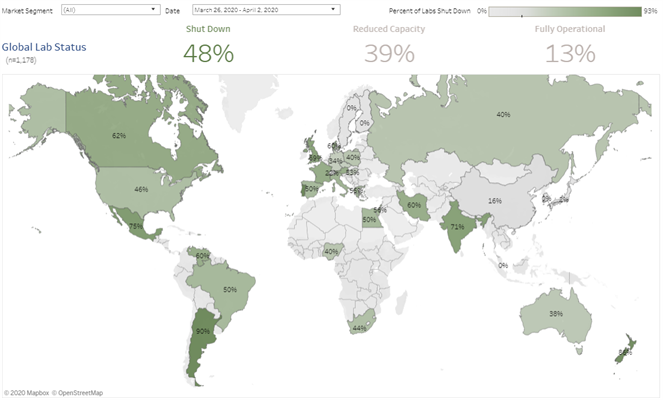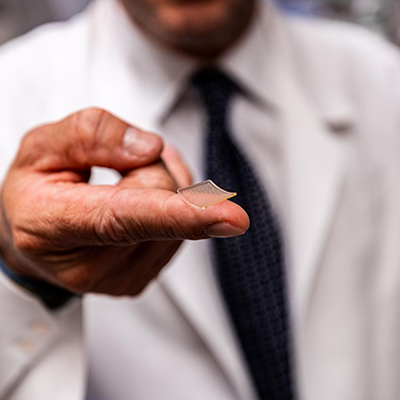In all, 48% of academic and pharma/biotech labs responding to the survey reported that they were closed. Another 39% reported that they were operating at reduced capacity, and only 13% of labs surveyed reported being fully operational. The study was performed by market research firm BioInformatics, a partner of The Science Advisory Board, with data collection completed on April 2.
Of the 1,178 participants in the study, 74% were academic researchers and 26% were pharmaceutical or biotech scientists. On a regional basis, 33% of participants were based in North America, 31% in Europe, 24% in Asia, and the remaining 12% were from various other locations around the world.
Wide-ranging impacts on multidisciplinary researchers
In total, 48% of respondents who participated in the survey indicated that their labs were shut down due to concerns about COVID-19. This impact affects academic laboratories (56%) much more than pharmaceutical or industry laboratories (27%). The situation is dire for academic scientists, only 10% of whom responded that their labs were fully operational.
| Research laboratory status reported by respondents as a result of COVID-19 | |||
| Academic (n = 871) | Biotech/Pharma (n = 298) | Average (n = 1,178) | |
| Shut down | 56% | 27% | 48% |
| Reduced capacity | 34% | 51% | 39% |
| Fully operational | 10% | 22% | 13% |
Bioinformatics COVID-19 lab tracker, powered by The Science Advisory Board
According to participants, labs had been closed for an average of 2.5 weeks as of the initial survey date, and they were preparing for the closures to last for an average of seven additional weeks.
Moreover, of the remaining labs that were fully or partially open (612 labs), 32% conduct research related to infectious diseases, compared with 68% that are not involved in infectious disease research. Unexpectedly, many infectious disease research labs (71%) are running at reduced capacity.
| Research focus of operational labs as a result of COVID-19 | ||
| Infectious disease (n = 197) | Other (n = 415) | |
| Operational labs (n = 612) | 32% | 68% |
Scientists are concerned
To understand how dramatic changes in work environments affect scientists, survey participants were asked about their level of concern surrounding COVID-19 and their ability to conduct work and research. Results were collected into a COVID-19 Scientist Sentiment Tracker.
Scientists were asked to rank their feelings of worry and work impacts due to the novel coronavirus pandemic on a scale of 0 to 10, with 0 indicating "no impact" or "not worried" and 10 meaning a "significant impact" or "extremely worried." Survey results were used to generate "work impact" and "worry level" scores that represent scientist sentiment.
At the time of the initial survey, scientists indicated an average work impact score of 8.06, suggesting that their work is considerably impacted due to COVID-19. The initial average worry level score of participants was 7.26, suggesting that many scientists were worried that the economic downturn would limit their ability to work.
| COVID-19 Scientist Sentiment Tracker | ||||
| Closed labs | Infectious disease labs -- open | Noninfectious disease labs -- open | Average score | |
| Work impact | 8.81 | 7.71 | 7.22 | 8.06 |
| Worry level | 7.62 | 7.06 | 6.86 | 7.26 |
When broken down by research focus, infectious disease researchers working at operational labs indicated an impact score of 7.71 compared to an impact score of 8.81 for researchers whose labs are shut down. Interestingly, there were no significant differences in the level of worry among infectious disease researchers or other types of researchers.
What does it all mean?
With skyrocketing unemployment rates in many industries, scientists seem to be concerned with whether they will be able to continue their research -- or even retain their jobs. Many researchers indicated that funds are being used to maintain current animal studies and to pay staff. These efforts to keep labs afloat could leave some researchers feeling uncertain about ongoing projects.
The high level of concern about work impact could be the result of stay-at-home orders, which have resulted in many lab closures, particularly in academia. Or social distancing which limits the productivity of laboratories, as staff must be reduced during this time. Moreover, while the internet keeps many scientists connected to their work, some researchers may find the lack of meetings and conferences disruptive to their collaborative efforts.
Many researchers rely on grants and other soft funds to conduct their research, and, following the trend set by the U.S. National Institutes of Health, many nonessential programs are being temporarily shut down. While many scientists are deemed "essential" employees, for those who are not, this could be a factor contributing to their uncertainty.
Despite most researchers feeling somewhat worried that the economy will affect their work, they also expect to get back to conducting their research after the crisis passes.
The Science Advisory Board will be tracking scientists' sentiment regarding COVID-19 over the coming months. Be sure to check back with us frequently for updates.
Copyright © 2020 scienceboard.net






